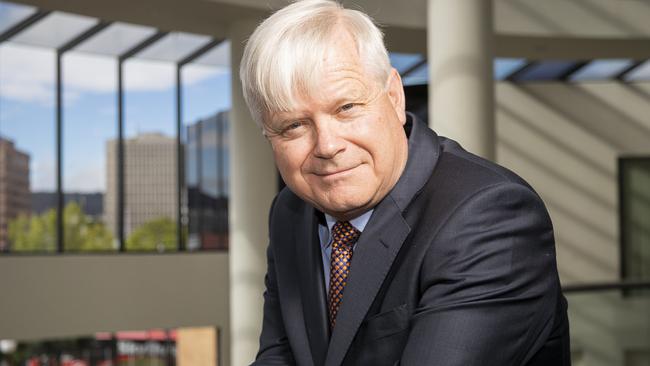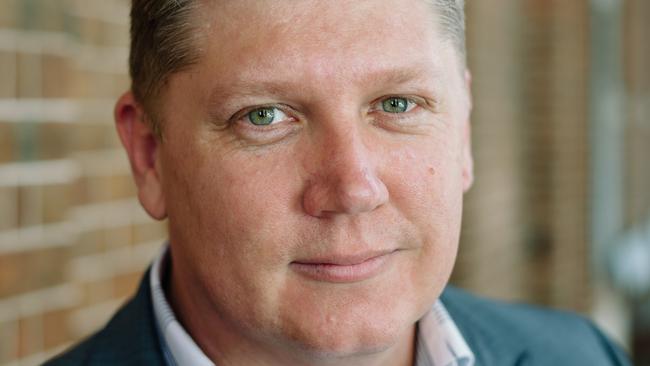‘The Great Rusted On’: Why Aussies are to blame for low wages
Aussies are making one huge mistake when it comes to their job and it could mean they are losing out on thousands – just when the cost of living is soaring.

At Work
Don't miss out on the headlines from At Work. Followed categories will be added to My News.
Aussies have fallen into the trap of the “Great Rusted On” rather than the Great Resignation – sticking with companies for an extraordinary amount of time and cheating themself out of proper pay rises, according to one expert.
Just 7.5 per cent of people changed jobs in the year to February 2021, according to Australian Bureau of Statistics (ABS) data, reaching a new low with 82,000 fewer people quitting their roles than the previous year.
If this trend continues, it will mean the average Australian would only change jobs just under once every 14 years, said Deloitte Access Economics partner Chris Richardson, thus lowering their chances of any big increase to their pay.
“The evidence is that the more you change jobs, the more on average your wage goes up, so one of the reasons wage growth has been weak in Australia is we haven’t been brave enough to jump to the next opportunity,” he told news.com.au.
“So far we remain incredibly conservative workers when it comes to changing jobs.”

The Great Resignation, a phenomenon that has been playing out in the US in particular with millions quitting their jobs, has been less of an issue in Australia so far, Mr Richardson said.
“The people who left their jobs in the US had terrible pay and had very little reason to be loyal to an employer,” he said.
“And for all the challenges that Australia faces – and we face a bunch – the numbers tell a story that we don’t hate the boss quite as much as what you think.”
He said Aussies need to “rattle the cage” when it comes to their pay and treat it like they would if they were looking for a better deal for their mortgage or internet provider.
“Pay rises are very hard to come by and it’s those who do move or who go talk to the boss that are the ones that actually get the increase,” he said.

Financial stress impacting people’s work
But the skyrocketing cost of living could start to heavily influence people’s attitudes to their pay and the way they feel about their employer, new research has shown.
Australian employees are worried about their finances, with 56 per cent reporting they were stressed about money and those aged 18-24 more likely to be feeling it, according to a survey by Employment Hero.
It also found that 31 per cent of staff do not feel fairly paid for the work they do, particularly women who were 14 per cent more likely to say that their pay was below average.
In further signs that Aussies could soon be embracing The Great Resignation, 15 per cent of workers say the stress around money had them seeking a better paid job.
Alex Hattingh, chief people officer at Employment Hero, said companies can’t ignore their staff’s financial wellbeing. She said 19 per cent of employees claim to have lost their motivation at work due to financial stress.
“Employers will not be able to ignore these warning signs. According to our findings, employees are looking for their employers to support their financial wellbeing in a number of ways,” she said.
“This includes a strong percentage of workers wanting help through paid bonuses or overtime. Other key areas include free or subsidised health insurance and additional superannuation contributions.”

What young people want
Those aged 18-24 were also 97 per cent more likely to want their employers’ help in investing their salary into stocks, Ms Hattingh said.
Behavioural scientist Aaron McEwan from global research and advisory firm Gartner said Millennials and Gen Z could be part of the mass exodus from workplaces and the push for bigger wages.
But it isn’t because of what he describes as unfair arguments that the younger generation feels entitled to more money without putting the work in. Instead, Mr McEwan said it is about housing affordability as they become increasingly priced out of the market.
“Millennials and Gen Z get accused of being too ambitious and that they don’t want to hang around and do their time but they can’t afford to anymore. If the only way to get a genuine pay rise is to change jobs and the only way to increase your potential earning income as a young person is to change jobs as no one is offering you a significant pay rise, then why wouldn’t you?” he told news.com.au.
“I will say that, to organisations, if you can’t hold on to your young people, you need to start offering something to keep them, such as learning and growth opportunities and increasing pay in line with inflation at the very least, if not more, and I don’t think many organisations are doing that.”

It’s time to hit up your boss or leave
Mr McEwan also wasn’t convinced that the Great Rusted On trend would continue, particularly as pandemic conditions had played into Aussies sticking with their jobs.
He said many companies had cut out a lot of middle management positions leaving people stuck in jobs, while economic uncertainty also made staff less likely to hop companies.
“The first thing that goes when the economy gets tough is training and development budgets and then the promotion opportunities, so people are slowing down in their career to a degree and it’s not for want of wanting to move around – it’s just the opportunities haven’t been there,” he said.
“But now they do have the opportunity and the next few months are going to be really interesting to see how people respond to the big unknown factors, which are interest rates and the war in Europe.
“If the world goes through another period of economic uncertainty and other events, and the thing that is happening in Australia is the second once-in-a-generation flood event impacting the east coast of Australia and the outbreak of war in Europe, and that makes people think very carefully about these decisions.”

But he agreed the only way for Aussies to get a pay rise that would address the soaring cost of living was to change jobs.
“So we know people are changing jobs and are being attracted by significant compensation increases when they move. But when you stay in your job it’s not looking great – any pay rise above 3 per cent I think people would be overjoyed about it,” he said.
“If you were looking for a time when you can reach out to your employer and have a pretty strong position of negotiation, now is the time.”
Cost of living could influence moves
Overall, if the unemployment rate remains low in Australia and the cost of living and interest rates rise, Mr McEwan predicted that it will prompt many to find new jobs with bigger pay packets.
He said The Great Resignation wasn’t expected to hit Australia until March, so it was too early to say what exactly was happening with that trend.
But he added that research from the Australian Human Resources Institute in December and February showed a quarter of organisations had experienced rates of resignation over 25 per cent.
Originally published as ‘The Great Rusted On’: Why Aussies are to blame for low wages





